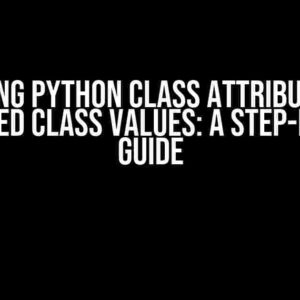Ah, the joys of working with Pyright, the static type checker for Python. While it’s an incredibly powerful tool for catching type-related errors, it can sometimes be a bit… finicky. Specifically, have you ever encountered the frustrating error message “Annotated types do not match”? Yeah, we feel you. But fear not, dear developer, for we’re about to dive into the world of Pyright and annotated types, and emerge victorious with a solution to this pesky problem!
What are Annotated types, anyway?
Before we dive into the solution, let’s take a quick detour to understand what annotated types are and why Pyright is so particular about them.
Annotated types are a way of adding type hints to your Python code, which allows Pyright (and other type checkers) to perform static type checking. This means that Pyright can analyze your code without running it, and alert you to potential type-related errors before you even execute the code. It’s like having a super-smart, code-whispering sidekick that keeps you on the straight and narrow!
The Problem: Annotated types not matching
So, what happens when Pyright encounters annotated types that don’t match? Well, it gets a bit grumpy, and throws an error message like this:
error: Annotated types do not match
=> file.py:10:0
9 | def my_function(my_var: str) -> None:
10 | my_var = 42 # error: Type of expression is incompatible with annotated type
Yep, that’s right. Pyright is complaining because the annotated type of `my_var` (a string) doesn’t match the actual type of the value being assigned to it (an integer). Makes sense, right?
So, how do I stop Pyright from complaining?
Ah, the million-dollar question! There are a few ways to address this issue, and we’ll cover each of them in detail.
1. Fix the type mismatch
The most straightforward solution is to simply fix the type mismatch. In our example above, we can change the assignment to ensure that `my_var` is indeed a string:
def my_function(my_var: str) -> None:
my_var = "42" # Now Pyright is happy!
Easy peasy, lemon squeezy!
2. Use the `Any` type
Sometimes, you might not know the exact type of a variable upfront, or you might be working with a library that doesn’t provide explicit type hints. In such cases, you can use the `Any` type to indicate that the variable can be of any type:
from typing import Any
def my_function(my_var: Any) -> None:
my_var = 42 # Now Pyright is happy!
By using the `Any` type, you’re essentially telling Pyright to trust you and not worry about the type mismatch. However, keep in mind that this approach can lead to type-related issues down the line, so use it sparingly!
3. Use the `cast()` function
Another way to address the issue is to use the `cast()` function from the `typing` module. This function allows you to explicitly cast a value to a specific type, even if Pyright wouldn’t normally agree:
from typing import cast
def my_function(my_var: str) -> None:
my_var = cast(str, 42) # Now Pyright is happy!
The `cast()` function is like a magic wand that makes Pyright believe the type you specify is correct. However, be careful not to abuse this power, as it can lead to type-related issues if used improperly!
4. Suppress the error with a comment
As a last resort, you can suppress the error by adding a special comment to your code. This is not recommended, as it can lead to type-related issues and make your code harder to maintain:
def my_function(my_var: str) -> None:
my_var = 42 # type: ignore # Don't do this unless you really need to!
The `# type: ignore` comment tells Pyright to ignore the type mismatch and not report an error. However, this approach can lead to type-related issues and make your code harder to maintain, so use it sparingly (if at all)!
Best Practices for Working with Annotated Types
Now that we’ve covered the solutions, let’s talk about some best practices for working with annotated types:
- Be explicit about types: Whenever possible, use explicit type hints to indicate the expected type of a variable or function parameter. This helps Pyright (and other type checkers) understand your code better and catch type-related errors early.
- Use the `Any` type judiciously: While the `Any` type can be useful in certain situations, it’s essential to use it sparingly and only when absolutely necessary. Overusing `Any` can lead to type-related issues and make your code harder to maintain.
- Avoid suppressing errors: Try to avoid using the `# type: ignore` comment unless you have a very good reason to do so. Instead, focus on fixing the underlying type mismatch or using a more explicit type hint.
- Keep your type hints up-to-date: As your code evolves, make sure to update your type hints accordingly. This helps Pyright (and other type checkers) continue to provide accurate error reporting and helps you catch type-related issues early.
Conclusion
And there you have it, folks! With these solutions and best practices, you should be well-equipped to tackle the “Annotated types do not match” error and keep Pyright happy. Remember to be explicit about types, use the `Any` type judiciously, avoid suppressing errors, and keep your type hints up-to-date.
By following these guidelines, you’ll not only reduce the frustration of working with Pyright but also write more maintainable, type-safe code that’s easier to understand and debug.
Happy coding, and may the type-checked force be with you!
| Solution | Description |
|---|---|
| Fix the type mismatch | Change the assignment to ensure the annotated type matches the actual type. |
| Use the `Any` type | Indicate that the variable can be of any type, but use sparingly to avoid type-related issues. |
| Use the `cast()` function | Explicitly cast a value to a specific type, but be careful not to abuse this power. |
| Avoid using this approach unless absolutely necessary, as it can lead to type-related issues and make code harder to maintain. |
If you have any more questions or need further guidance, feel free to ask in the comments below!
Frequently Asked Question
Are you tired of Pyright complaining about annotated types not matching? Don’t worry, we’ve got you covered! Here are some frequently asked questions and answers to help you resolve this issue.
What are annotated types, and why is Pyright complaining about them?
Annotated types are a way to add type hints to your Python code. Pyright is complaining because it’s trying to validate these types, and it’s finding discrepancies. This can happen when the type annotations don’t match the actual types used in the code.
How do I fix the issue of annotated types not matching?
To fix this issue, review your code and ensure that the type annotations match the actual types used. Check for any typos, incorrect type definitions, or outdated type annotations. You can also try re-running Pyright with the –type-checking-mode=off flag to disable type checking temporarily.
What if I’m using a third-party library with incorrect type annotations?
If you’re using a third-party library with incorrect type annotations, you can try updating the library to the latest version or filing an issue with the library maintainers to fix the type annotations. Alternatively, you can use the # type: ignore comment to disable type checking for specific lines of code.
Can I disable type checking for specific files or directories?
Yes, you can disable type checking for specific files or directories by adding a pyrightconfig.json file with the appropriate settings. For example, you can set “typeCheckingMode”: “off” for specific files or directories to disable type checking.
How do I prevent Pyright from complaining about annotated types in the future?
To prevent Pyright from complaining about annotated types in the future, make it a habit to keep your type annotations up-to-date and accurate. Regularly review your code and run Pyright with the –type-checking-mode=strict flag to catch any type discrepancies early on.


